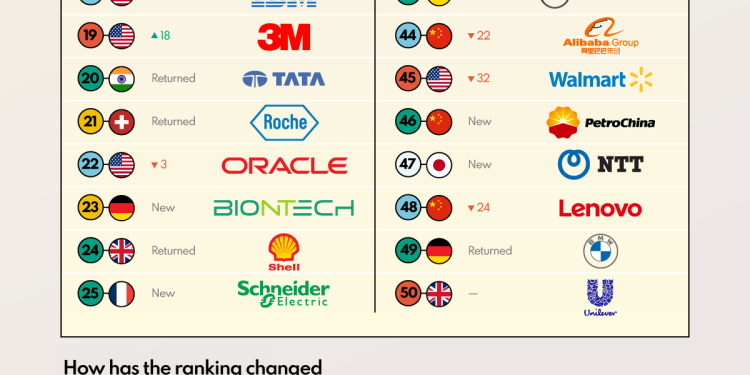The unveiling of the top innovative organizations for the year 2023 has sparked significant enthusiasm among the business community. In an effort to create this highly anticipated ranking, Boston Consulting Group (BCG) conducted a comprehensive survey involving more than 1K innovation executives from the December of the year 2022 to January of the year 2023. BCG evaluated companies based on four essential criteria, including global mindshare, industry peer perspective, industry disruption, and value creation.
Securing the leading position for the fourth year in a row, Apple cemented its reputation as a trailblazer in the technology industry. Apple has consistently been recognized as the most innovative organization since the year 2005, except for the year 2019. Tesla, a prominent player in the realms of transportation and energy, has made an impressive leap forward, capturing the second spot and experiencing a substantial rise in rank compared to the previous year. Meanwhile, industry powerhouses Amazon and Alphabet have successfully maintained their positions within the top five. Microsoft, however, has encountered a slight setback, slipping three spots in the rankings. On the other hand, Moderna, a pioneer in the healthcare sector, has seen a positive upward shift, climbing one spot in the rankings.
Samsung, a leading technology conglomerate from South Korea, showcases its commitment to innovation through substantial investments. With over $17 billion spent on R&D in 2021, Samsung ranks among the world’s top spenders in this area. The company’s impressive portfolio also includes the highest number of U.S. patents granted in 2022.
The report by BCG provides valuable insights into notable companies and their significant role in driving innovation. One such company is Bosch, a renowned German engineering and technology firm. Bosch’s remarkable global research and development (R&D) initiatives are particularly noteworthy. Having an extensive workforce spread across 130 diverse locations, Bosch has consistently allocated a significant proportion of its sales revenue towards research and development (R&D) endeavors from 2018 to 2021.
The rankings also highlight that innovation goes beyond the technology sector. McDonald’s, a prominent player in the restaurant industry, has embraced innovation and invested in technological advancements. By acquiring startups such as Apprente and Dynamic Yield, McDonald’s aims to improve the customer experience through voice-based technologies and customizable online interactions. These efforts are focused on enhancing the efficiency of ordering processes and expanding the range of choices available to customers, ultimately enhancing the overall dining experience.
Looking at the larger picture, an analysis of the nationalities represented among the most innovative companies reveals intriguing patterns. Over the years, the United States and China have experienced a significant rise in their presence, surpassing companies hailing from European nations like Germany, the UK, and Italy. This shift signifies the expanding economic impact of China and implies that Chinese firms might continue to dominate forthcoming rankings. A prime example of this is Huawei, a Chinese technology powerhouse, which has consistently maintained its position among the top 50 companies since 2014, underscoring China’s influential role in the field of innovation.














